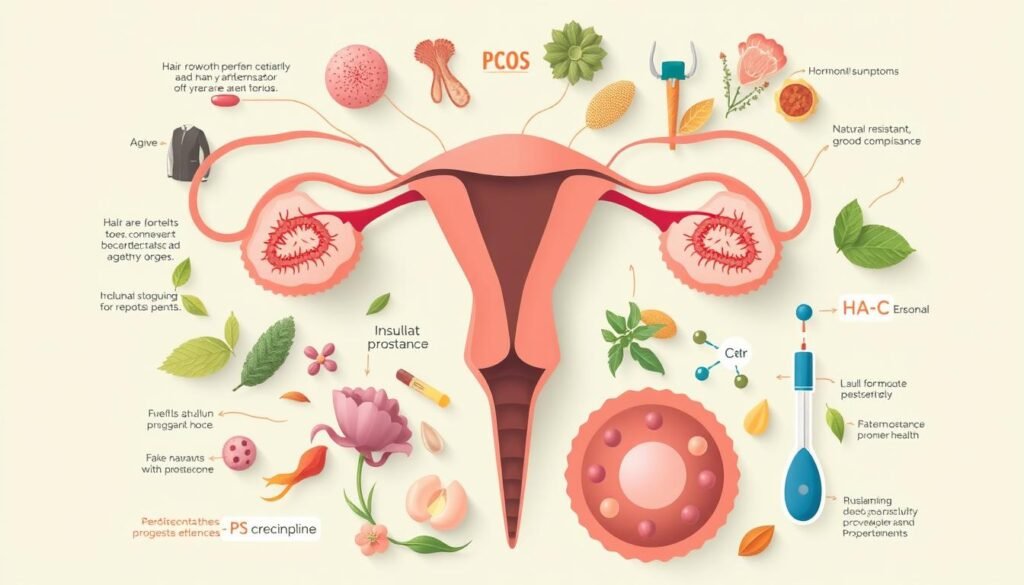Did you know about 10% of women of childbearing age have polycystic ovary syndrome (PCOS)? This condition goes beyond impacting menstrual cycles and fertility. It often causes significant weight gain around the abdomen, known as “PCOS belly.” The culprits behind these symptoms include insulin resistance and high androgen levels, making weight loss tough. Yet, there are effective ways to handle these issues and live healthier.
Getting to know PCOS, its causes, and how to manage weight is vital for those affected. We’re diving into the main reasons behind PCOS belly and offering useful tips. If you’re aiming to take back control of your health, this article has you covered.
Key Takeaways
- PCOS affects 10% of women of childbearing age, significantly impacting weight and hormonal health.
- Insulin resistance plays a key role in increasing abdominal fat in PCOS sufferers.
- Weight loss through diet and exercise can alleviate many PCOS-related symptoms.
- A multidisciplinary approach can enhance management of PCOS symptoms.
- Low-carbohydrate and high-fiber diets show promise in reducing insulin levels and aiding weight management.
Understanding PCOS and Its Impact on Weight Gain
Polycystic Ovary Syndrome (PCOS) affects up to 15% of women and those assigned female at birth. It’s known for high levels of male hormones, or androgens. These lead to missed periods, a lot of hair growth, and noticeable weight gain around the belly.
Weight control is a big issue for many with PCOS. Over half are overweight. This makes other symptoms worse, like infertility and high cholesterol levels. A key factor is insulin resistance, which messes with hormone levels and boosts hunger.
To fight this weight gain, understanding how insulin resistance and hormones interact is key. Changes in diet and more exercise can make a big difference. Even losing 5% to 10% of body weight can help manage cholesterol and prediabetes symptoms.
Dealing with PCOS varies by person. Some may need drugs to help ovulate if they want to get pregnant. Birth control pills can also regulate hormones and periods. It’s vital to get medical advice if you have PCOS, especially if you’re trying to get pregnant or have ongoing issues. Check out this resource to learn more.
What is PCOS?
Polycystic Ovary Syndrome, often called PCOS, is a common disorder. It affects 6% to 12% of women who can have babies. This ailment shows through different signs, affecting health, the ability to have children, and mental well-being. By understanding PCOS definition and its signs, people can find the right ways to deal with it.
Definition and Symptoms of PCOS
The symptoms of PCOS differ a lot among individuals. Common signs include:
- Irregular menstrual cycles
- Excess hair growth (hirsutism)
- Acne or oily skin
- Weight gain, often around the belly
- Infertility challenges
These signs often come from hormonal imbalances. In PCOS, women may have too many male hormones. This can mess up many body processes. It can lead to more health issues.
Hormonal Imbalances in PCOS
Hormonal imbalances are key in PCOS. High levels of androgens can cause the symptoms we talked about. These imbalances can make insulin resistance worse. That increases obesity risk and other problems. Blood tests can find these hormone issues. This lets doctors give the right help.

| Symptom | Description |
|---|---|
| Irregular Menstrual Cycles | Infrequent or long menstrual periods |
| Hirsutism | More hair growth on face, chest, and back |
| Acne | More breakouts and oily skin |
| Weight Gain | More body fat, especially around the belly |
| Infertility | Harder to get pregnant |
Knowing the symptoms of PCOS and the hormone issues is key for handling it well. This info helps when talking to doctors about what to do next.
Hormonal Factors Contributing to PCOS Belly
Learning about hormonal factors helps handle PCOS belly. The link between pcos insulin resistance and belly fat is key. Insulin resistance makes insulin less effective, leading to high insulin and androgen levels. This causes weight gain around the abdomen.
Insulin Resistance and Hormonal Weight Gain
Many women with PCOS face insulin resistance. This means their bodies struggle to use insulin properly, raising insulin levels. High insulin levels cause hormonal weight gain by making the ovaries release more androgens. These lead to more belly fat. Managing insulin through diet and exercise is crucial. Check out studies on abdominal adiposity and for more details.
Elevated Androgen Levels
High androgen levels are common in PCOS. These can lead to unwanted hair growth, severe acne, and thinning hair. They also change fat distribution, causing more belly fat. This increases the risk of heart disease and diabetes. Controlling androgen levels can help reduce PCOS’s harmful effects.

How PCOS Causes Bloating and Weight Gain
PCOS bloating is a major problem for many women. Studies say 73.8% of women in the U.S. feel bloating is their top issue. Changes in hormones and stomach issues cause this constant bloating. This bloating often comes with the challenge of managing weight in PCOS, leading to more frustration due to belly weight gain.

Women with PCOS might have a different gut makeup that makes bloating worse. This can also make digestive discomfort stronger. People with PCOS are more likely to get irritable bowel syndrome (IBS). About 29.7% of women with PCOS deal with IBS bloating, versus only 11% of the general population. Trying a low-FODMAP diet and exercising more can help manage PCOS weight management.
Some medicines for PCOS can also cause bloating. Hormonal birth control, which helps with cycle regulation in PCOS, can do the same. Keeping track of what you eat can help find what makes bloating worse. This way, you can tailor your diet to avoid those triggers.
Knowing how these symptoms link together is key to managing PCOS well. Looking into PCOS weight management helps women make changes to lessen bloating and get better. Diet, exercise, and dealing with stress are important in fighting PCOS discomfort.
The Role of Diet in Managing PCOS
Diet is key in controlling Polycystic Ovary Syndrome (PCOS). It greatly alters weight, hormones, and overall health. Carefully choosing what to eat helps lower insulin, which eases PCOS symptoms. A good PCOS diet includes high-fiber foods, lean meats, and healthy fats. It avoids foods that are processed or full of sugar. This plan leads to better health for those with PCOS.
Suggested PCOS Diet for Weight Management
Managing PCOS with diet means eating lots of nutrient-rich foods. You should eat:
- Fruits and vegetables for their vitamins and minerals
- Whole grains like brown rice and quinoa
- Healthy fats from olive oil and avocados
- Legumes including lentils and chickpeas
- Fish rich in omega-3, such as salmon or sardines
Eating small, nutritious meals through the day keeps blood sugar stable. Dr. Mahalingaiah says to eat bigger meals during active times. This helps your body use energy well.
Foods to Avoid with PCOS
Knowing what foods to skip is crucial. Some foods worsen PCOS symptoms and can make you gain weight or face other issues:
- Avoid fried foods and saturated fats
- Steer clear of red meat and processed snacks
- Say no to refined flour and white rice
- Cut back on sugary drinks and alcohol
Cutting these foods helps handle insulin resistance, common in 50% to 75% of PCOS sufferers. Balanced eating and avoiding bad foods boosts dietary management.
For more details on a PCOS diet, check this useful guide.
Exercise Solutions for PCOS
Exercise is vital for managing PCOS and improving health. Doing consistent PCOS exercise has many benefits of physical activity, like better weight control. People with PCOS often find it hard to manage their weight due to insulin resistance. So, adding various workouts to their daily life is key.
Importance of Regular Physical Activity
Anyone with PCOS should exercise for 150 minutes every week at a moderate pace. This effort can boost insulin sensitivity, improve mood, and help with weight loss. Regular activity has been shown to reduce fasting insulin levels and cut down abdominal fat. These changes can make ovulation regular again and improve fertility for those facing PCOS-related infertility issues.
Types of Exercises Recommended for PCOS
To get the most benefits of physical activity, include different exercises in a PCOS-friendly plan:
- Aerobic exercises like brisk walking or cycling lower BMI and insulin resistance.
- Strength training increases muscle tone and metabolism, aiding in weight management.
- HIIT may help reduce testosterone levels and boost insulin sensitivity.
- Mind-body exercises, such as yoga and pilates, help with relaxation and calorie burning, aiding stress relief and health.
Building a sustainable, enjoyable fitness routine is crucial. Start with easy activities like walking, then slowly increase intensity. Pairing exercise with a healthy diet enhances PCOS symptom management, highlighting the need for a well-rounded wellness approach.
| Type of Exercise | Description | Benefits |
|---|---|---|
| Aerobic Exercise | Activities like running, cycling, or swimming. | Improves insulin sensitivity and promotes weight loss. |
| Strength Training | Exercises using weights or body resistance. | Increases muscle mass, metabolic rate, and hormone regulation. |
| HIIT | Short bursts of intense exercise followed by rest. | Effective in reducing insulin resistance and testosterone levels. |
| Mind-Body Exercises | Practices including yoga and pilates. | Reduces stress and improves mental health while aiding weight loss. |
PCOS Supplements: Do They Help?
Women with PCOS look for many ways to feel better, including taking PCOS supplements. These supplements can help with PCOS symptoms, especially with lifestyle changes. Each supplement targets different parts of this condition.
Common Supplements for Managing PCOS Symptoms
Research shows some PCOS supplements can be helpful. Here are a few:
- Inositol: This helps lower insulin levels and improve blood sugar, important for women with PCOS.
- Vitamin D: Many women with PCOS don’t have enough Vitamin D. Taking it can help make periods more regular and improve the chances of getting pregnant with treatment.
- B Vitamins: Vitamins B6 and B12 help with insulin resistance and mood.
- Omega-3 Fatty Acids: These supplements work against insulin resistance and can lower cholesterol in women with PCOS.
- Berberine: Useful in lowering insulin and glucose levels, this also impacts cholesterol and fertility positively.
- Curcumin: Known for fighting inflammation, curcumin can help control blood sugar.
- Magnesium: This is good for those with insulin resistance due to a magnesium deficiency.
Consultation with Healthcare Providers
Talking to a healthcare provider is key before starting any supplements for PCOS. They can check your health and hormone levels to find what works best for you. Getting personalized advice ensures the supplements will be safe and effective.
| Supplement | Benefits | Effectiveness in PCOS |
|---|---|---|
| Inositol | Lowers insulin levels, improves blood sugar | Effective in reducing symptoms |
| Vitamin D | Improves menstrual regularity, enhances fertility | Essential for women with deficiencies |
| B Vitamins | Supports mood, combats insulin resistance | Helps improve overall health |
| Omega-3 Fatty Acids | Reduces cholesterol, aids in insulin resistance | Promotes cardiovascular health |
| Berberine | Reduces insulin and glucose levels | Effective for fertility improvement |
| Curcumin | Improves glycemic control | Helpful for inflammatory issues |
| Magnesium | Aids in insulin sensitivity | Beneficial for PCOS management |
Stress Management and Its Effects on PCOS
Managing stress is key for those with PCOS. A 2016 study found that people with PCOS are much more likely to feel stressed, anxious, and depressed than those without it. This stress can make PCOS symptoms worse, like making you tired, messing up your periods, and causing stomach issues.
It’s important to know that stress can make inflammation from PCOS even worse. Stress can also lead to hormonal imbalances such as high androgens. This can result in weight gain, diabetes, acne, and unwanted hair.
Taking steps to manage stress can really help. Techniques like therapy, meditation, deep breathing, and mindful movement can make you healthier and happier. These methods not only help you relax but can also lessen the effects of stress on PCOS.
| Stress Management Techniques | Benefits |
|---|---|
| Therapy | Provides support and coping strategies for emotional well-being |
| Meditation | Reduces anxiety and improves mental clarity |
| Deep Breathing | Helps in calming the nervous system and reducing stress |
| Mindful Movement | Combines physical activity with mindfulness, enhancing emotional health |
By using these strategies for stress management, you can better manage PCOS. This leads to a healthier life and better hormonal balance.
Understanding PCOS Cravings and Their Management
Women with PCOS face challenges like strong food cravings. These cravings are due to hormonal changes and insulin problems. They make it hard to control weight and can lead to emotional eating. To improve health, it’s key to tackle the main causes of these cravings.
Addressing Emotional and Hormonal Cravings
Knowing what triggers your PCOS cravings is the first step in managing them. Stress and poor sleep can make cravings worse, leading to bad eating habits. To keep blood sugar steady, eat foods high in protein and whole grains. This helps you control how much you eat and avoids binge eating.
Another helpful strategy is eating smaller meals throughout the day. This improves how your body uses insulin and reduces strong cravings. By understanding your body, you can choose foods that meet your needs and help with weight loss. For more tips on dealing with PCOS cravings, check out this research on hormonal effects and eating.